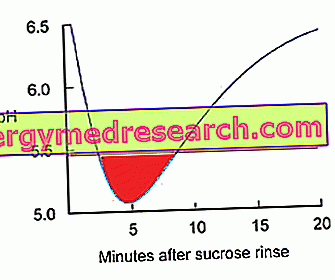BIBLIOGRAPHY:
Six middle-distance runners were evaluated under basal conditions and after they had taken 300 mg of bicarbonate per kg of body weight from 2 hours to 30 minutes before a race of 800 meters. The result of this integration was an increase in the pH and concentration of blood bicarbonate, with an improvement in performance of about 2.9 seconds.
Ten female subjects were supplemented with 300mg of bicarbonate per kg of body weight dissolved in 400ml of water 90 minutes before a maximal 60-second ergometric test. The result of this integration was an increase in work capacity due to an increase in the extracellular buffer system.
PHYSIOOGIC PRINCIPLES: bicarbonate is an alkalizing substance and as such represents an effective system to buffer the acidity of the lactate produced by the muscles during an intense physical effort.
SODIUM BICARBONATE: SIDE EFFECTS:
- diarrhea present in about 50% of the athletes who take it; this problem can be solved by taking the substance in various doses every 20 minutes starting from 3 hours before the race up to an hour before drinking abundantly up to thirty minutes before the race (at least one liter of water in total).
- The integration with 20 g of sodium bicarbonate (dose for a man of about 70 kg) brings 5 g of sodium to the body, with consequent hypernatremia, hypertension, less sweating and greater thirst stimulation.
The flavor of baking soda is hardly pleasing to most athletes.
INTEGRATION: the optimal contribution seems to be that of 300mg (0.3g) of bicarbonate per Kg of body weight.
Bicarbonate supplementation is synergistic with that of carnosine (which is the most potent intra-muscular lactic acid buffer) or its beta-alanine precursor. To test the effectiveness of the supplementary protocol it is possible to follow a scheme of this type:
- 2 days of light training
- simulation of the training race (cover the race distance in the shortest possible time)
- 2 days of light training
- simulation of the training race (cover the race distance in the shortest possible time) after bicarbonate, citrate and possibly carnosine supplementation.
BIBLIOGRAPHY
1. Lavender, G. & Bird, SR (1989). Effects of sodium bicarbonate ingestion upon repeated sprints. British Journal of Sports Medicine 23, pp. 41-45.
2. Johnson, WR & Black, DH (1953). Comparison of effects of certain blood alkalinizer and glucose upon competitive endurance. Journal of Applied Physiology 5, pp. 577-578.
3. Hood, VL, Schubert, C., Keller, U., Muller, S. (1988). Effect of systemic pH on pHi and lactic acid generation in exhaustive forearm exercise. American Journal of Physiology 255 (24), pp. F479-F485.
4. Costill, DL, et al. (1984). Acid base balance during repeated bouts of exercise. Influence of HC03. International Journal of Sports Medicine 5, pp. 225-231.
5. Wilkes, D., Gledhill, N. & Smith, R. (1983). Effect of induced metabolic alkalosis on 800-m racing time. Medicine and Science in Sports and Exercise 15 (4), pp. 277-280.
6. McNaughton, LR & Cedaro, R. (1991). The effect of sodium bicarbonate on rowing ergometer performance in elite rowers. The Australian Journal of Science and Medicine in Sport 23 (3), pp. 66-69.



